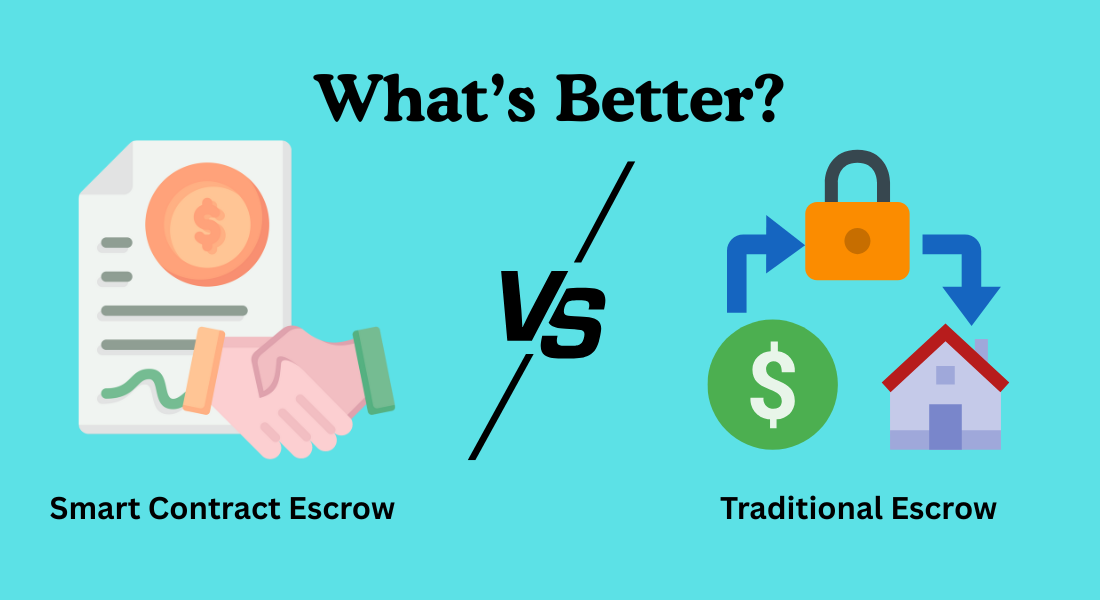
Smart Contract Escrow vs. Traditional Escrow: What’s Better?
In today’s rapidly evolving world of digital finance, two types of escrow services are vying for attention: traditional escrow services and smart contract escrow. These services have one goal in mind: ensuring that both parties in a transaction are protected. However, the methods through which they achieve this goal are vastly different. With technology disrupting the way we conduct business, understanding the nuances between these two forms of escrow is essential. In this article, we will explore both traditional and smart contract escrows, their differences, advantages, and which one may be better suited for specific types of transactions.
What is Traditional Escrow?
Traditional escrow has been a trusted method for securing transactions for centuries. It involves a neutral third party, known as the escrow agent, who holds and manages funds, documents, or assets on behalf of two parties involved in a transaction. This intermediary ensures that the buyer and seller fulfill their contractual obligations before releasing the assets or funds to the appropriate party.
Key Characteristics of Traditional Escrow:
-
Human Mediators: A professional, often a lawyer or an escrow company, manages the transaction.
-
Legal Framework: Relies heavily on existing legal systems to ensure compliance and enforcement.
-
Manual Processes: Involves paper documentation, physical meetings, or email communication.
-
Fees: Traditional escrow services can be costly, with fees that vary based on the complexity of the transaction.
Benefits of Traditional Escrow:
-
Trust in Legal Systems: It operates within established legal systems, offering a sense of security that parties are following the rules.
-
Human Oversight: In the case of disputes or ambiguity, human intervention can provide a level of understanding and decision-making that technology lacks.
-
Widely Recognized: Traditional escrow is a universally accepted practice, providing a high degree of confidence for both parties in most industries.
What is Smart Contract Escrow?
Smart contract escrow, on the other hand, is a modern solution that utilizes blockchain technology to replace the need for a human intermediary. A smart contract is a self-executing contract where the terms of the agreement are written directly into lines of code. These contracts automatically enforce the terms once the conditions are met, with no need for manual intervention.
Key Characteristics of Smart Contract Escrow:
-
Blockchain Technology: Smart contracts operate on decentralized blockchain networks, which are tamper-proof and transparent.
-
Automation: No human oversight is required for transaction execution; the contract runs automatically when predefined conditions are met.
-
Transparency and Security: Both parties can track the contract and verify actions in real-time on the blockchain.
-
No Middleman: Unlike traditional escrow, there is no central authority managing the contract—everything is handled by code.
Benefits of Smart Contract Escrow:
-
Cost-Efficiency: No intermediary fees are required, which can save both parties money.
-
Faster Transactions: Smart contracts execute automatically without the need for manual intervention, speeding up the transaction process.
-
Security and Transparency: Blockchain’s transparency ensures that all transactions are publicly recorded, while the decentralized nature prevents fraud or tampering.
-
Global Reach: Because smart contracts operate on the internet, they are ideal for international transactions and cross-border agreements.
Smart Contract Escrow vs. Traditional Escrow: A Comparative Analysis
Now that we’ve understood both types of escrow services, let’s delve into their comparative features. Here’s a breakdown of the key differences between traditional and smart contract escrow:
| Feature | Traditional Escrow | Smart Contract Escrow |
|---|---|---|
| Third-Party Involvement | Requires a neutral intermediary (e.g., escrow agent, lawyer) | No intermediary, the contract is self-executing |
| Speed of Transaction | Slower due to manual processing and paperwork | Faster transactions are executed automatically |
| Cost | Higher fees due to intermediary and administrative costs | Low or no fees since there are no intermediaries |
| Security | Vulnerable to fraud or mistakes by the escrow agent | High security due to blockchain’s decentralization |
| Transparency | Limited transparency, parties must trust the escrow agent | Full transparency, both parties can monitor progress |
| Dispute Resolution | Can involve legal disputes requiring human intervention | Minimal human intervention, automatic resolution based on code |
| Legal Recognition | Universally recognized in most legal jurisdictions | Can face legal hurdles in certain jurisdictions due to its novelty |
Which One Is Better: Smart Contract Escrow or Traditional Escrow?
Determining which escrow service is "better" largely depends on the specific needs of the transaction, the parties involved, and the nature of the agreement.
When Traditional Escrow is Better:
-
Real-World Legal Environments: If a transaction requires adherence to specific legal systems or might involve significant legal consequences, traditional escrow might be the more reliable option.
-
Complex Transactions: For high-value, high-risk transactions such as real estate or mergers and acquisitions, traditional escrow may be preferred due to the human oversight and ability to handle disputes or unusual situations.
-
Trust in Human Mediation: When the parties are unfamiliar with each other or the transaction involves non-standard terms, having a human mediator can provide reassurance.
When Smart Contract Escrow is Better:
-
Low-Cost, High-Speed Transactions: For parties looking for fast, low-cost solutions (e.g., freelancers, tech-based services), smart contract escrow offers an efficient alternative without the need for human intermediaries.
-
Tech-Savvy or Crypto Transactions: When the transaction involves cryptocurrencies or decentralized applications (dApps), smart contracts are an excellent fit due to their seamless integration with blockchain technology.
-
Transparent and Secure Deals: For parties wanting full transparency and automation in their transactions, smart contract escrow is the ideal choice as it offers increased security and trust.
Conclusion
Both traditional escrow and smart contract escrow have their respective strengths and weaknesses. Traditional escrow is time-tested, offering human oversight and legal recognition, making it ideal for complex, high-value transactions. On the other hand, smart contract escrow is revolutionary, offering faster, cheaper, and more secure transactions without the need for intermediaries.
The decision between smart contract escrow and traditional escrow depends largely on the type of transaction, the level of trust between the parties, and the need for legal frameworks. As blockchain technology continues to evolve and gain recognition, it’s possible that smart contract escrow will become more widely accepted and might eventually overshadow traditional methods in many industries.
By understanding the differences and advantages of each, you can make an informed decision that best fits your business needs, whether you’re involved in real estate, online services, or the cryptocurrency space.
Key Takeaways:
-
Traditional escrow is best suited for complex, high-value transactions requiring human intervention and legal oversight.
-
Smart contract escrow offers cost efficiency, speed, transparency, and security, especially for digital or crypto-based transactions.
-
The future of escrow likely lies in the integration of blockchain and smart contracts, offering a decentralized and automated solution for various industries.
Understanding the differences between these escrow services is essential for modern business transactions. Both have their place in the world, but as technology continues to advance, the smart contract model is undoubtedly growing in prominence.





